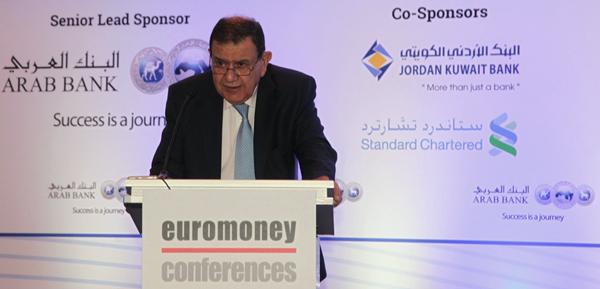You are here
Senior officials discuss outlook for Kingdom’s economy at Euromoney Jordan Conference
By Mohammad Ghazal - Apr 25,2016 - Last updated at Apr 25,2016

Central Bank of Jordan Governor Ziad Fariz speaks on Monday at the opening of the Euromoney Jordan Conference (Petra photo)
AMMAN — The first credit information bureau will play a key role in increasing financial inclusion and eventually triggering economic growth, Central Bank of Jordan (CBJ) Governor Ziad Fariz said Monday.
Speaking at the opening of the Euromoney Jordan Conference, Fariz said the bureau will help make available credit for those who were never able to get credit from banks.
“The bureau is important for enhancing financial inclusion, especially for startups and women and increasing their participation in the economy,” said Fariz, adding that only 25 per cent of Jordanians have bank accounts.
“We have to exert efforts to increase this percentage to 50 per cent, which is internationally acceptable,” added the governor at the event, which brought together around 400 high-level government officials, investors, financiers, business leaders and entrepreneurs from Jordan and across the Middle East region to address the development of Jordan’s innovation economy.
During the event, Planning and International Cooperation Minister Imad Fakhoury reviewed Jordan’s National Vision and Strategy 2025 which charts the path for the future and determines the integrated economic and social framework that will govern the economic and social policies based on providing opportunities for all.
“This national strategy is foreseen to enable Jordan to move rapidly to the diversification of resources, development of infrastructure, and capitalise on existing strengths. Its basic principles include promoting the rule of law and equal opportunities, increasing participatory policy making, achieving fiscal sustainability and strengthening institutions,” said Fakhoury.
The strategy is being implemented through three phases. The Kingdom’s 2016-2018 Executive Development Programme (EDP) forms the first implementation phase.
This programme has been prepared with full coordination for the first time with the General Budget Department so that the outputs of the development programme are the reference in the preparation of the budget which ensures the direction of financial allocations in the areas of development, that have been planned for.
The EDP also takes into consideration the Governorates Development Programmes for 2016-2018, he added.
The government has also identified 15 priority initiatives that were included both the long term strategy and medium term plan. These priority initiatives are in the sectors of water, healthcare, tourism, energy, vocational training, investment, transport, ICT, education and local development, Fakhoury continued.
Regional circumstances and disruption associated with them have impacted Jordan for very long... However, Jordan has always been able to accommodate its strategies and plans accordingly.
“We always seek to find opportunities in challenges, thus though we have long-term strategy “Jordan 2025”, but its implementation is through flexible medium term developments programmes that are revised annually. This enables us to take all new developments into account within our plans. For instance, currently the (2016-2018) EDP is being revised to integrate the outcomes of the 2015 Population Census and the Sustainable Development Goals of the 2030 Agenda into the programme,” Fakhoury elaborated.
Organised by Euromoney Conferences, the event also attracted a significant number of international delegates from further afield, including attendees from Australia, Canada, France, the United Kingdom and the United States of America.
Sharing their views during the opening session, panellists including Ahmad Abu Eideh, chief executive officer, Middle East at Standard Chartered, and Trevor Cullinan, director of sovereign ratings at Standard & Poor’s, debated the outlook for Jordan’s economy, discussing the effect of low energy prices, the future of the International Monetary Fund programme and public debt management, as well as addressing the expected impact of the first phase of the Jordan’s 10-year economic development programme, ‘Jordan 2025’.
The event also explored the important role that Jordan’s small and medium-sized enterprises sector plays in the country’s wider economic development.
Panellists such as Fawaz Zu’bi, founder and chief executive officer of Accelerator Technology Holdings, Rasha Manna, managing director of Endeavour Jordan, and Marion Hoenicke, head of the lending operations division at European Investment Bank, discussed the challenges and opportunities faced by entrepreneurs and start-ups.
They also examined the role that supporting organisations, such as donors and credit agencies, play in helping these companies to grow and thrive, as well as how Jordan can further cement its status as a hub for entrepreneurship in the region.
Another key theme of the conference was that of innovation and the development of a digital ecosystem in Jordan.
Panellists explored how digital technology and information communication technology contribute to the advancement of the innovation economy, looking at its potential benefits to the Kingdom’s economy as a whole.
Related Articles
Minister of Planning and International Cooperation Imad Fakhoury headed a meeting of the coordination committee for preparing the 2016-2018 Executive Development Programme (EDP), which will incorporate the first phase of the “Jordan 2025 vision and national strategy”.
AMMAN — Euromoney Conferences will hold its annual Euromoney Jordan Conference on Wednesday, March 22 to highlight the role that financial e
AMMAN — Euromoney Conferences, leading organiser of conferences for cross-border investment and capital markets, announced Sunday in a press
















